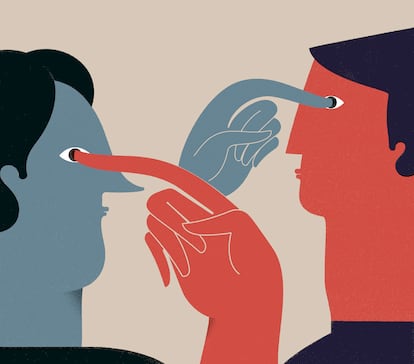The mental health challenges of polarization
During times of crisis and uncertainty, radicalization and ideological tribalism fuel a harmful cycle where emotions overshadow reason

What I think and feel is true. If you mess with my favorite politician, you mess with me. I don’t read anything from that newspaper. If she said that, I’m not interested. It’s us or them… Ideological polarization is when differences of opinion progressively grow larger. Affective polarization is tied to negative perception, rejection, and lack of respect for differing opinions or individuals one doesn’t identify with. In this process, the diverse qualities of others are simplified to a single element, says Míriam Juan-Torres González, a researcher at the University of California, Berkeley. This fosters a group unity that fosters hostility toward adversaries.
A study by the LLYC consulting firm found a 35% increase in polarization in Spain over the past five years, triggering a wave of mental health consultations by people struggling with the stress of a polarized environment. The polarization process involves the interplay of individual and social factors, making it difficult to determine if someone is inherently polarized or influenced by society. Vulnerability is higher among individuals with deep-rooted ideologies and strong group identification, who exhibit cognitive rigidity and perceive reality in simplistic terms. These individuals often have a low tolerance for frustration and poor life satisfaction. The development of identity during adolescence, within contexts like school and family, plays a role in the polarization process. Peer pressure leads to emotionally charged core beliefs that solidify in crisis situations even when proven wrong.
Spanish sociologist Luis Miller’s book about polarization notes that social factors like unemployment, inequality, economic crises and social media are major contributors to polarization. In The Righteous Mind: Why Good People Are Divided by Politics and Religion (2012) social psychologist Jonathan Haidt explains how confirmation bias on social media hinders the open-minded exchange of ideas. The news media and politicians also play a role in spreading narratives that deepen divisions and emphasize group differences. The topics that fuel polarization can vary depending on the context, society, and the pressing issues of the day. It’s a harmful cycle in which emotions often overshadow rational arguments.
Guillermo Lahera, head of psychiatry at the Prince of Asturias University Hospital in Madrid, notes the harmful effects of ideological tribalism. The consequences of a polarized environment are disastrous for individuals and society as a whole. LLYC says polarization is like an addictive drug — the more polarized people are, the more willing they are to spread misinformation, especially in anonymous environments. The more extreme the message of a polarized person, the more appealing their perspective may appear. However, it’s important to consider the long-term effects of heightened hostility, anger and diminished well-being. This can lead to poor decision-making, lack of trust in institutions, disengagement with politics and decreased community engagement.
How can we counteract polarization? One way is to foster a culture of debate within schools and families. Engaging people with differing viewpoints can help bridge divides. Focus on presenting well-reasoned arguments rather than resorting to personal attacks. An immediate, practical step is to limit exposure to social media and be mindful of its usage. Think about your motives before sharing content, and whether it contributes anything new and positive to the discussion. Be skeptical of news that triggers extreme emotions and seek diverse sources of information.
Good mental health depends on having meaningful emotional connections within a well-functioning society. While polarization may temporarily satisfy an unmet need, it’s ultimately just an excuse to avoid critical thinking.
Sign up for our weekly newsletter to get more English-language news coverage from EL PAÍS USA Edition
Tu suscripción se está usando en otro dispositivo
¿Quieres añadir otro usuario a tu suscripción?
Si continúas leyendo en este dispositivo, no se podrá leer en el otro.
FlechaTu suscripción se está usando en otro dispositivo y solo puedes acceder a EL PAÍS desde un dispositivo a la vez.
Si quieres compartir tu cuenta, cambia tu suscripción a la modalidad Premium, así podrás añadir otro usuario. Cada uno accederá con su propia cuenta de email, lo que os permitirá personalizar vuestra experiencia en EL PAÍS.
¿Tienes una suscripción de empresa? Accede aquí para contratar más cuentas.
En el caso de no saber quién está usando tu cuenta, te recomendamos cambiar tu contraseña aquí.
Si decides continuar compartiendo tu cuenta, este mensaje se mostrará en tu dispositivo y en el de la otra persona que está usando tu cuenta de forma indefinida, afectando a tu experiencia de lectura. Puedes consultar aquí los términos y condiciones de la suscripción digital.








































